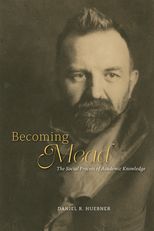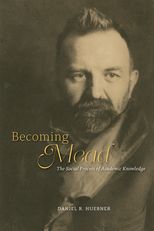Becoming Mead: The Social Process of Academic Knowledge
Becoming Mead: The Social Process of Academic Knowledge
Cite
Abstract
This study contributes to the sociology of knowledge and the history of the human sciences by tracing the complex social action processes through which knowledge is produced about a major classical author, George Herbert Mead. The case raises acute questions regarding how authoritative knowledge comes to be produced about an intellectual and about the social nature of knowledge production in academic scholarship. Instead of treating Mead’s problematic reputation as a separate topic of study from his own intellectual biography, the analysis reconceptualizes both as essentially knowledge production processes with empirical connections in identifiable social actions. Substantive chapters utilize archival and primary document research to examine the centrality of Mead’s public speaking and engagement with the social problems of territorial Hawaii, the variety of representations Mead’s students made of his courses and his students’ influences on him, the problematic process of constructing posthumous volumes attributed to Mead, the mobilization of controversial claims about him by former students on the basis of their sense of his approval and collaboration, the development of patterns of published reference to Mead along lines of social connection and in response to local institutional transformations, and the reconstruction of domains of Mead’s research that have been neglected in dominant accounts of his philosophy. The study provides a novel, productive approach to knowledge making in scholarship, which focus on empirical social action processes as they connect and change over time instead of any single set of documents, concepts, mechanisms, or individuals.
-
Front Matter
-
Introduction
-
Part I Rethinking Mead
-
Part II Notes and Books
-
Part III Influence and Interpretation
-
End Matter
Sign in
Personal account
- Sign in with email/username & password
- Get email alerts
- Save searches
- Purchase content
- Activate your purchase/trial code
Institutional access
-
Sign in through your institution
- Sign in with a library card Sign in with username/password Recommend to your librarian
Institutional account management
Sign in as administratorPurchase
Our books are available by subscription or purchase to libraries and institutions.
Purchasing information| Month: | Total Views: |
|---|---|
| November 2022 | 1 |
| November 2022 | 1 |
| November 2022 | 1 |
| November 2022 | 1 |
| November 2022 | 1 |
| November 2022 | 1 |
| November 2022 | 1 |
| November 2022 | 1 |
| November 2022 | 1 |
| August 2023 | 2 |
| August 2023 | 2 |
| August 2023 | 3 |
| August 2023 | 2 |
| August 2023 | 2 |
| August 2023 | 2 |
| August 2023 | 2 |
| August 2023 | 2 |
| August 2023 | 2 |
| September 2023 | 1 |
| December 2023 | 2 |
| January 2024 | 1 |
| February 2024 | 1 |
| February 2024 | 1 |
| February 2024 | 1 |
| April 2024 | 1 |




Get help with access
Institutional access
Access to content on Oxford Academic is often provided through institutional subscriptions and purchases. If you are a member of an institution with an active account, you may be able to access content in one of the following ways:
IP based access
Typically, access is provided across an institutional network to a range of IP addresses. This authentication occurs automatically, and it is not possible to sign out of an IP authenticated account.
Sign in through your institution
Choose this option to get remote access when outside your institution. Shibboleth/Open Athens technology is used to provide single sign-on between your institution’s website and Oxford Academic.
If your institution is not listed or you cannot sign in to your institution’s website, please contact your librarian or administrator.
Sign in with a library card
Enter your library card number to sign in. If you cannot sign in, please contact your librarian.
Society Members
Society member access to a journal is achieved in one of the following ways:
Sign in through society site
Many societies offer single sign-on between the society website and Oxford Academic. If you see ‘Sign in through society site’ in the sign in pane within a journal:
If you do not have a society account or have forgotten your username or password, please contact your society.
Sign in using a personal account
Some societies use Oxford Academic personal accounts to provide access to their members. See below.
Personal account
A personal account can be used to get email alerts, save searches, purchase content, and activate subscriptions.
Some societies use Oxford Academic personal accounts to provide access to their members.
Viewing your signed in accounts
Click the account icon in the top right to:
Signed in but can't access content
Oxford Academic is home to a wide variety of products. The institutional subscription may not cover the content that you are trying to access. If you believe you should have access to that content, please contact your librarian.
Institutional account management
For librarians and administrators, your personal account also provides access to institutional account management. Here you will find options to view and activate subscriptions, manage institutional settings and access options, access usage statistics, and more.